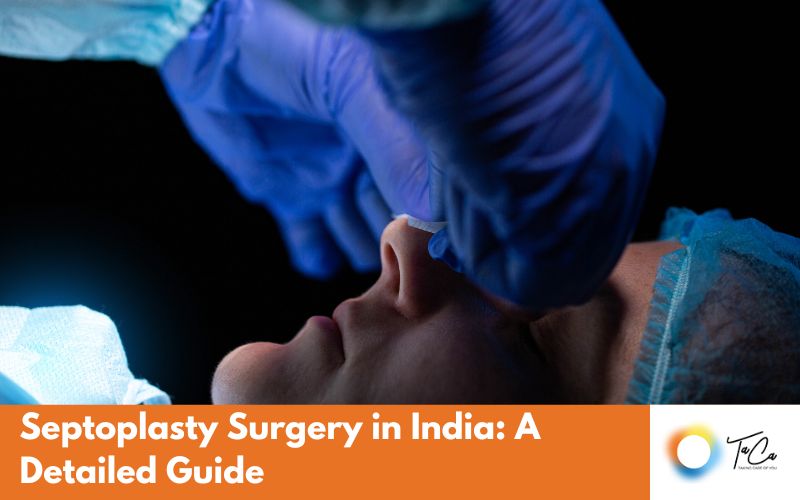Septoplasty surgery is a medical procedure that is performed to correct a deviated septum, which can cause difficulty breathing through the nose. The procedure involves repositioning or removing the bone and cartilage that makes up the septum, the thin wall that separates the nasal passages. In this article, we will provide a detailed guide to septoplasty surgery, including what to expect before, during, and after the procedure.
This condition is caused by a variety of factors, such as genetics, injury, or trauma to the nose. The symptoms of a deviated septum include difficulty breathing through the nose, snoring, frequent sinus infections, and a reduced sense of smell.
Septoplasty surgery is recommended for individuals who have a severely deviated septum that is causing significant breathing problems or other symptoms that are affecting their quality of life. The procedure can also be used to correct a crooked or misshapen nose, although this is typically considered a cosmetic procedure rather than a medical necessity.
What are the preparations required before going for this surgery?
Considering septoplasty surgery requires some preparations for the procedure to ensure the best possible outcome. Here are the steps you need to take for preparing for the surgery:
- Find a good ENT surgeon: Check for a qualified ENT surgeon with experience in septoplasty. Look for a surgeon who is board-certified and has a good reputation for performing successful septoplasty procedures.
- Discuss your medical history with the ENT specialist: Your ENT doctor must know about medical conditions you have, as well as any medications you are currently taking.
- Stop smoking: Smoking increase the risk of complications during surgery and can also slow down the healing process. If you are a smoker, it’s suggested to stop smoking at least a few weeks
- Avoid certain medications: Certain medications, such as aspirin or other blood thinners, often increase the risk of bleeding during the procedure.
Questions you should ask to your ENT surgeon or Hospital before choosing surgery as the treatment option
- How is septoplasty performed, and what anesthesia is used?
- What is the expected recovery time, and what can I do to aid in the healing process?
- Will septoplasty resolve my breathing problems, or are there additional treatments that may be necessary?
- Are there any lifestyle changes I should make before or after the surgery?
- How much experience do you have performing septoplasty procedures, and what is your success rate?
- Will my insurance cover the cost of the surgery?
- Are there any reasons why I may not be a good candidate for septoplasty, such as medical conditions or medications I am taking?
- Are there any dietary restrictions or preparations I should make before the surgery?
Septoplasty Surgery Procedure
Septoplasty surgery is performed under general anesthesia, which means you will be asleep during the procedure. The surgery usually takes between 30 minutes to an hour, depending on the extent.
During the surgery, your doctors make an incision inside your nostril to access the septum. They will then remove or reposition the bone and cartilage to correct the deviation. The incision is closed with dissolvable stitches, which do not need to be removed after the surgery.
After the surgery, you will be monitored in a recovery room until you are awake and alert. You might feel some discomfort, swelling, and bruising around the nose and eyes, which is normal and should subside within a few days.
Septoplasty Surgery Recovery Process
Recovering from septoplasty normally takes one to two weeks. Here are few tips to help you recover more quickly and comfortably:
- Take pain medication only as directed: Your ENT specialist surgeon prescribe pain killers to help manage any discomfort.
- Use ice packs: Applying ice packs to the nose reduces swelling and discomfort. Use a clean cloth or towel to wrap the ice pack and apply it to the nose for 15-20 minutes at a time.
- Avoid strenuous activity: Avoid any strenuous activity, such as exercise or heavy lifting, for at least two weeks after the surgery. This reduces the risk of bleeding and promote healing.
- Elevate your head while sleeping: Sleeping with your head elevated is helpful to reduce swelling and promote healing. Use pillows to prop your head up while sleeping.
Septoplasty Surgery Cost in India
If you are considering septoplasty surgery in India, research and find a qualified surgeon with a good reputation like TaCa Center for Surgery has onboarded some of the best ENT surgeons in India.
The cost of septoplasty surgery in India ranges from approximately INR 50,000 to INR 2,50,000






